The Radical Sign
You have learned that numbers can be obtained by raising rational numbers to integral exponents.
For example


When the exponent is 2 we get squares or square numbers, the number which is raised by the exponent 2 is called the square root of the square so obtained.




 is the square of and is the square root of
is the square of and is the square root of
 We write the square root as .
We write the square root as .
 The symbol is called the radical.
The symbol is called the radical.
 We can also write or the radical sign can be written as the power exponent of 1/2.
We can also write or the radical sign can be written as the power exponent of 1/2.
 We have
We have
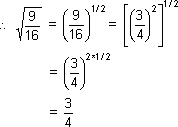
In this section we will be dealing with squares, perfect square numbers, and how to find the square roots of squares using
-
the prime factorization method
the division method.
Perfect Squares
If m and n are natural numbers such that n = m2 then n is the square of m and m is the square root of n.
For example,
4 = 2* 2 = 22
4 is the square of 2
2 is the square root of 4.
The square of any integer is called a perfect square.
Consider the following table
Number |
Square |
1 |
12 = 1 * 1 = 1 |
2 |
22 = 2 * 2 = 4 |
3 |
32 = 3 * 3 = 9 |
4 |
42 = 4 *4 = 16 |
5 |
52 = 5 *5 = 25 |
6 |
62 = 6 * 6 = 36 |
7 |
72 = 7 * 7 = 49 |
8 |
82 = 8 * 8 = 64 |
9 |
92 = 9 * 9 = 81 |
10 |
102 = 10 * 10 = 100 |
11 |
112= 11 * 11 = 121 |
12 |
122 = 12 * 12 = 144 |
13 |
132 = 13 * 13 = 169 |
14 |
142 = 14 * 14 = 196 |
15 |
152 = 15 * 15 = 225 |
16 |
162 = 16 * 16 = 256 |
17 |
172 = 17 * 17 = 289 |
18 |
182 = 18 * 18 = 324 |
19 |
192 = 19 * 19 = 361 |
20 |
202 = 20 * 20 = 400 |
Properties of Square Numbers:
-
No square number has a units digit of 2, 3, 7, or 8. Check the table or your calculator. Choose any number and
find its square. Its units digit will never be 2, 3, 7, or 8. So any number with 2, 3, 7, or 8 as the units digit is
never a perfect square.
Given the units digit of a number, we can determine the units digit of its square.
A number with units digit 1 or 9 has a square with units digit 1.
A number with units digit 2 or 8 has a square with units digit 4.
A number with units digit 3 or 7 has a square with units digit 9.
A number with units digit 4 or 6 has a square with units digit 6.
A number with units digit 5 or 0 has a square with units digit 5 or 0.
The number of zeros at the end of a perfect square is always even. If a number has 0 as its units digit for example
20, its square 400 ends in double zero. If it has two zeros at the end as in 400 its square has four zeros 160000.
So the square of a number always has double number of zeros at the end of its square. A number ending with
an odd number of zeros is never a perfect square example 4000.
If a number is even or odd then so is its square as in 62 = 36, 72 = 49.
A perfect square leaves a remainder of 0 or 1 on division by 3.
If n is a perfect square, then 2n can never be a perfect square.
For example, 81 is a perfect square. 2* 81 = 162 is not a perfect square.
VIII. The number 1, 11, 111 …. have special properties.
-
12 = 1
112 = 1 2 1
1112 = 1 2 3 2 1
11112 = 1 2 3 4 3 2 1
-- = ----------
1111111112 = 1 2 3 4 5 6 7 8 9 8 7 6 5 4 3 2 1
12 = 1
112 = 1 2 1 and 1 + 2 + 1 = 4 = 22
1112 = 1 2 3 2 1 and 1 + 2 + 3 + 2 + 1 = 9 = 32
-- = --------
1111111112 = 1 2 3 4 5 6 7 8 9 8 7 6 5 4 3 2 1
and 1 + 2 + 3 + 4 + 5 + 6 + 7 + 8 + 9 + 8 + 7 + 6 + 5 + 4 + 3 + 2 + 1 = 81 = 92
121 * (1 + 2 + 1) = 121 * 4 = 484 = 222
12321 * (1 + 2 + 3 + 2 + 1) = 12321 * 9 = 110889 = 3332
12345678987654321* (1 + 2 + 3 + 4 + 5 + 6 + 7 + 8 + 9 + 8 + 7 + 6 + 5 + 4 + 3 + 2 +1)
= 9999999992
Check the above on your calculator.
Example 1
Check and see if any of the given numbers is a perfect square. Give one reason why it isn't a perfect square.
a) 33453 b) 52698 c) 99880
Solution:
| |
Reason: |
| a) 33453 is not a perfect square. |
| b) 52698 is not a perfect square. |
| c) 99880 is not a perfect square. |
|
| Its units digit is 3. |
| Its units digit is 8. |
| Its units digit is a single zero. |
|
Try these problems
-
Which of the following numbers are perfect squares? Give a reason for you answer.
21222
576
7928
-
Observe the following patterns and fill in the missing digits.
112= 1 2 1
1012 = 10201
10012 = 1002001
1000012 = 1 _ _ _ 2 _ _ _ 1
100000012= _ _ _ _ _ _ _ _ _ _ _
112 = 121
1012 = 10201
101012 = 102030201
10101012 = -----------------------
_____________2 = 10203040504030201
12 + 22 + 22 = 32
22 + 32 + 62 = 72
32 + 42 + 122 = 132
42 + 52 + __2 = 212
52 + _2 + 302 = 312
62 + 72 + __2 = __2


-
Using the column method find the squares of
a) 54 b) 95 c) 49
-
-
Find the smallest number by which 2028 must be divided so that it becomes a perfect square.
Find the square root of the number so obtained.
Find the least number by which 4851 must be multiplied so that the product becomes a perfect square.
Find the square root of the number so obtained.
Find the least number that must be subtracted from 26535 to make it a perfect square.
Find the least number that must be added to 15520 to make it a perfect square.
Answers to problems
-
21222 is not a perfect square, its units digit is 2.
576 is a perfect square, its units digit is 6.
7928 is not a perfect square. Its units digit is 8.
-
Following the given pattern.
100000012 = 1 0 0 0 0 2 0 0 0 0 1
Notice that the blanks should contain the same number of zeros as the given number of zeros.
-
Following the given pattern.
10101012 = 1020304030201
1010101012 = 10203040504030201
Note that the values 1, 2, 3, 4 depend on the number of 1's in the given number alternating with the zeros.
-
42 + 52 + 202 = 212
52 + 62+ 302 = 312
62 + 72 + 422 = 432
On the left-hand side, the product of the first two numbers give us the third number. On the right-hand side, the number is one more than the product of the first two numbers of the left-hand side.
-

 See properties of square numbers.
See properties of square numbers.
=9
 See properties of square numbers.
See properties of square numbers.
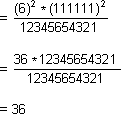
a. |
I
x2 |
II
2xy |
III
y2 |
Check examples for reason |
|
52
 |
2 * 5 * 4
 |
42
16 |
(54)2 = 2916
b. 95
I
x2 |
II
2xy |
III
y2 |
92
 |
2 *9 * 5
 |
52
25 |
(95)2 = 9025
c. 49
I
x2 |
II
2xy |
III
y2 |
42
 |
2 * 4 * 9
 |
92
81 |
(49)2= 2401.
-
-
We first use prime factorization.


3 is not a part of a pair. So 3 is the least number by which 2028 must be multiplied to get
a perfect square.
2028 * 3 = 6084

-
We first use prime factorization
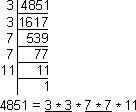
11 is the only number which is not part of a pair. So 11 is the least number by which we need to divide
4851 to obtain a perfect square.
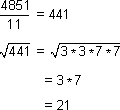
-
-
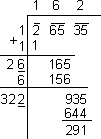
291 is the least number to be subtracted from 26535 to make it a perfect square.
-
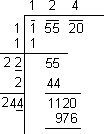
976 is less than 1120.
Repeating the process

The difference of 1225 and 1120 gives us the required
number 1225 – 1120 = 105.
The least number to be added to 1120 to make it a perfect square is 105.